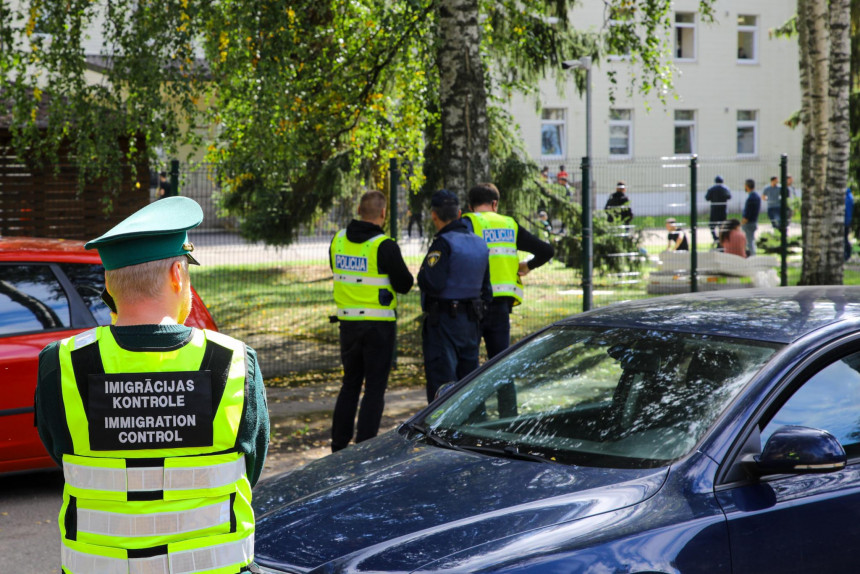Counter-terrorism plans are being updated because of the migrant crisis

After committing a serious crime - illegal crossing of the Latvian state border - migrants placed in the Mucenieki asylum seekers' center do not obey orders, rebel, violate the Covid protocol and protest against quarantine. The army is ready to help the police guard the facility. Muslims entering the country pose a serious threat to public security, so the State Security Service has updated its response plans to terrorist threats.
At present, about 20 migrants try to cross the Latvian border from Belarus every night, and the State Border Guard, with the support of the army, deters them from doing so. As the border has not been built due to the long-term negligence of the Ministry of the Interior, it is not fully under control, and there is a possibility that some criminals will still be able to enter the country. For the most part, nothing is known about the goals and intentions of these people. Also for the 260 migrants who managed to apply for asylum before the declaration of a state of emergency at the border and were kindly received at the Mucenieki asylum seekers' accommodation center, but now there are disturbances and refusal to comply with quarantine. Covid-19 is spreading among migrants. A riot started on Tuesday in Mucenieki. Some people tried to provoke a fight. Therefore, several police units are now involved in guarding the center, and the army will also provide support if necessary.
From asylum to prison
When quarantine ends, all migrants, including aggressive provocateurs, will have the right to disperse freely wherever they wish. As the Office of Citizenship and Migration Affairs, which manages the Mucenieki center, explains: "Asylum seekers staying in the ASAC Mucenieki have the right to move freely both in the center and to go outside the center." There is also a State Border Guard detention center for detained foreigners in Mucenieki village - migrants who have been detained for other crimes or who have not been taught to apply for asylum are placed there. But there are few of them. As they say at the border guard - they can be counted on the fingers of one hand. There are many more on the other side of the street - those admitted to the asylum seekers' accommodation center, as well as those wandering around uncontrolled, about whom nothing is known at all. Unofficially, it has been reported that after the involvement of the State Security Service, some migrants from the asylum center in Mucenieki village were transferred across the street to the place of imprisonment, and they will be denied asylum in Latvia. Neatkarīgā has already reported that the majority of migrants are men at the prime of their life. The fact that they came from Iraq means that they were most likely involved in active hostilities during the Iraq war, on one side or the other. So they also have military experience.
Counter-terrorism plan "Crowd" has been created
With the significant increase in the number of people entering the country illegally, the State Security Service has updated the already existing response plans in cases of terrorist threats in the Cabinet of Ministers, and has approved one that is completely new. The counter-terrorism plans "Object", "Ship" and "Airplane" were first developed and approved in 2008. As can be seen from these keywords, standard plans determine the actions of security and other state institutions in the event of terrorist attacks for specific purposes. The counter-terrorism plan “Object” plans for action in case the threat is directed against land objects; "Ship" means a response to threats to ships, ports and port facilities; "Airplane" - in case of danger to civil aircraft and objects. The anti-terrorism plan "Crowd" is new and approved for the first time this year. The State Security Service explains that it identified the need for a plan by assessing the terrorist threat trends in Europe and around the world in recent years: "Terrorists mostly choose easily accessible public places where large numbers of people congregate or mass events for their attacks, carrying out rapid and direct attacks on people and thus trying to create as many victims as possible. The plan shall set out the action to be taken by the responsible services in the event of a terrorist attack in a public place using a vehicle, cold weapons, firearms, improvised explosive devices or a combination of these."
The State Security Service continues to monitor the situation and assess the personalities of migrants admitted to the country, so that radical and extremist people do not enter the country. Yesterday, the State Security Service reported: "The level of the terrorist threat in Latvia is low."
*****
Be the first to read interesting news from Latvia and the world by joining our Telegram and Signal channels.